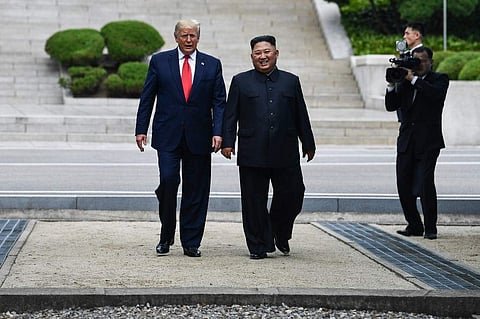

PANMUNJOM (SOUTH KOREA): Donald Trump stepped onto North Korean soil on Sunday as he met Pyongyang's leader Kim Jong Un in the Demilitarized Zone dividing the peninsula, in a symbolic diplomatic spectacle and a first for any American president.
After shaking hands with Kim over the line that marks where their two countries and their allies fought each other to a standstill in the 1950-53 Korean War, Trump walked for several steps into North Korean territory, before another handshake.
The two men then walked into Seoul's territory together - pausing on the line for photographers - where they were joined by South Korean President Moon Jae-in. "It's a great day for the world and it's an honour for me to be here. A lot of great things are happening," Trump said.
The impromptu meeting in the DMZ - which came after Trump issued an invitation on Twitter on Saturday - comes with negotiations between Pyongyang and Washington over the North's nuclear arsenal at a deadlock.
The two would "just shake hands quickly and say hello because we haven't seen each other since Vietnam", Trump said earlier.
Their first summit took place in a blaze of publicity in Singapore last year but produced a vaguely-worded pledge about denuclearisation, and a second meeting in Vietnam in February intended to put flesh on those bones broke up without agreement.
Contact between the two sides has since been minimal -- with Pyongyang issuing frequent criticisms of the US position -- but the two leaders have exchanged a series of letters and Trump turned to Twitter on Saturday to issue his offer.
In an unusually fast and public response, within hours of Trump's tweet, the North's official KCNA news agency quoted Vice Foreign Minister Choe Son Hui as saying the offer was "a very interesting suggestion".
Trump's entry onto North Korean soil is a dramatic re-enactment of the extraordinary scene last year when the young leader invited South Korean President Moon Jae-in to walk over the Military Demarcation Line that divides the Koreas.
Moon - who seized on last year's Winter Olympics to broker the process between Pyongyang and Washington, after tensions soared in 2017 amid missile and nuclear tests and mutual insults - will be going to the DMZ with Trump. "The leaders of the US and the North will have a handshake for peace at Panmunjom, the symbol of division, for the first time," Moon said, referring to the "truce village" in the DMZ.
Barren no man's land
But analysts were divided over the headline-grabbing meeting's potential impact on the underlying issues.
The four-kilometre-wide (2.5 miles) DMZ, running for 250 kilometres, is where the front line lay when the Korean War ended with a ceasefire rather than a peace treaty and is described as the world's last Cold War frontier.
John Delury of Yonsei University in Seoul said an encounter in the "barren no man's land that embodies the unhealed wound of post-WWII division, the Korean War, and 70 years of animosity" would help improve ties. "It's not just about denuclearisation and it's not all about a deal - important as those are," he said. "If Trump and Kim meet & can announce some kind of interim agreement, that's great. If they meet and don't, that's ok too. If in the end, they don't meet, it's good that Trump offered to," said Delury.
But Joshua Pollack of the Middlebury Institute of International Studies cast doubt on what it could achieve. The Hanoi meeting foundered amid disagreements on what the North - which has carried out six nuclear tests and developed missiles capable of reaching the entire US mainland - would be willing to give up in exchange for relief from sanctions that have crippled its economy.
"An agenda-free, made-for-TV encounter won't undo a year of inflated expectations and disappointment," said Pollack. What was needed, he added, was "something more than a one-page letter and another handshake".
The DMZ has been a regular stop for US presidents visiting the South, a security ally - although Trump's helicopter was forced to turn back by fog in 2017 - while Panmunjom saw the first two summits between Moon and Kim last year.